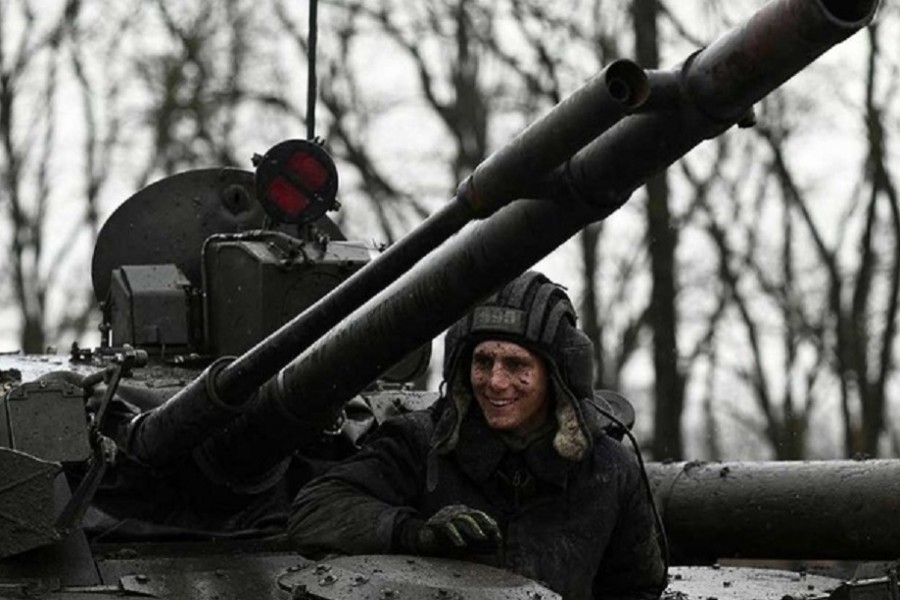Britain said on Thursday the West could face the "most dangerous moment" in its standoff with Moscow in the next few days, as Russia held military exercises in Belarus and the Black Sea following its troop buildup near Ukraine.
Tensions remained high, with Ukraine also staging war games, but leaders on all sides signalled they hoped diplomacy could still prevail in what British Prime Minister Boris Johnson called Europe's biggest security crisis for decades.
In a new round of diplomacy, Britain's foreign minister held talks in Russia, Johnson visited NATO headquarters in Brussels and officials from Russia, Ukraine, Germany and France were due to meet in Berlin to discuss fighting between government forces and pro-Russia separatists in eastern Ukraine since 2014.
Russia, which has more than 100,000 troops near Ukraine's borders, denies Western accusations that it may be planning to invade its former Soviet neighbour though it says it could take unspecified "military-technical" action unless demands are met, according to Reuters.
"I honestly don't think a decision has yet been taken (by Moscow on an attack). But that doesn't mean that it is impossible that something absolutely disastrous could happen very soon indeed," Johnson told a news conference with NATO Secretary-General Jens Stoltenberg in Brussels.
"This is probably the most dangerous moment, I would say, in the course of the next few days, in what is the biggest security crisis that Europe has faced for decades, and we've got to get it right. And I think that the combination of sanctions and military resolve, plus diplomacy is what is in order."
Stoltenberg also said it was a dangerous moment for European security, adding: "The number of Russian forces is going up. The warning time for a possible attack is going down."
In a new point of friction, Ukraine criticised Russian naval exercises that it said made navigation in the Black Sea and Sea of Azov "virtually impossible".
Visiting Moscow, British Foreign Secretary Liz Truss warned Russian Foreign Minister Sergei Lavrov of tough Western sanctions if Ukraine was attacked.
Lavrov said Moscow was in favour of diplomacy to resolve the crisis but that he could not understand British concerns over the drills in Belarus and denied Russia was coercing anyone.
He said the West was using Ukraine against Moscow and also accused Kyiv of attempting to rewrite agreements intended to end the conflict in eastern Ukraine.
"I'm honestly disappointed that what we have is a conversation between a dumb and a deaf person. It's as if we listen but we don't hear," Lavrov said.
SHUTTLE DIPLOMACY
Truss' talks in Moscow follow shuttle diplomacy from French President Emmanuel Macron, who visited Moscow and Kyiv earlier this week. In contrast to US and British leaders, Macron has played down the likelihood of a Russian invasion soon.
Russia has used the tensions to seek security concessions from the West that would include a promise to never admit Ukraine to NATO and halt the military alliance's expansion.
The EU said on Thursday it had delivered a single letter in response to Russia's proposals to member states on European security on behalf of the 27 foreign ministers of the bloc.
NATO and the United States have already portrayed Russia's main demands as non-starters.
Stoltenberg said last week that Russia was expected to have 30,000 troops in Belarus as well as Spetsnaz special operations forces, SU-35 fighter jets, S-400 air defence systems and nuclear-capable Iskander missiles.
After the initial phase of the joint drills was announced last month, Russia held a briefing for military attachés that lasted eight minutes and gave notice of an exercise that was already under way, a senior US state department official said.
"That's highly inconsistent with agreements for transparency for large military exercises in Europe. That's bad news," the official said.
Ukraine launched its own war games on Thursday which, like Russia's joint drills with Minsk, will run until Feb 20.
The Ukrainian forces, whose numbers have not been disclosed, are set to use Bayraktar drones and anti-tank Javelin and NLAW missiles provided by foreign partners. Kyiv was due to receive a further shipment of US military aid later on Thursday.
Despite the tension over the war games, the Kremlin's point man on Ukraine, Dmitry Kozak, was set to meet officials from Ukraine, Germany and France in Berlin for the latest talks on the conflict in eastern Ukraine.
Ukrainian Foreign Minister Dmytro Kuleba said the talks would be important and that he hoped they could get a Trilateral Contact Group on the conflict in east Ukraine functioning again. The group includes Russia, Ukraine and the Organisation for Security and Cooperation in Europe, a security watchdog.


